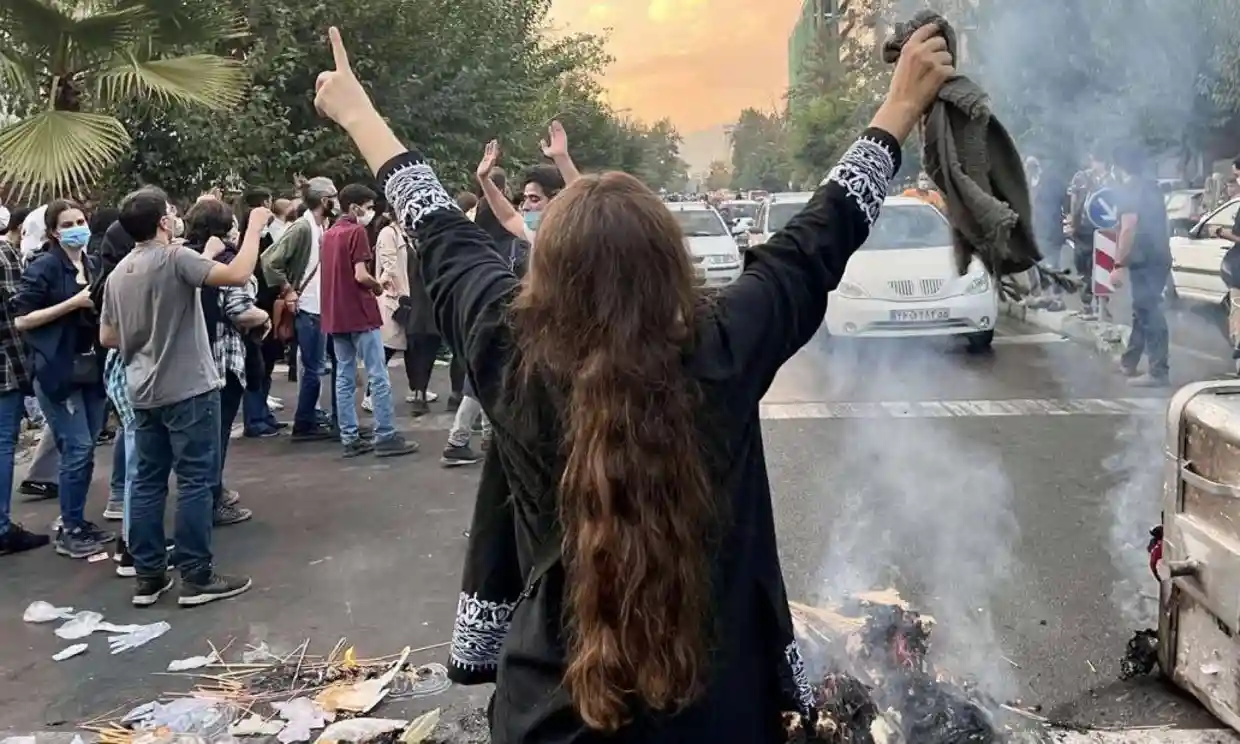Iranian Security forces have been involved in clashes with people takin part in a memorial for Mahsa Amini, according to a semi-official news agency. Thousands of people gathered in her hometown of Saqqez to mark 40 days since her death.
A few of those present at Mahsa Amini’s memorial clashed with the police, who dispersed them. “Following the scattered clashes,” ISNA news agency reported, “internet in Saqqez was cut off due to security considerations.”
A Kurdish woman who was detained for wearing improper hijab has died in Tehran. Her family are challenging the state’s conclusion that she died of a preexisting condition, and not because she was hit while being detained.
The recent weeks-long protests first broke out in Saqqez, a district in the northwestern Kurdistan province. They have since spread quickly across the country, persisting despite severe internet restrictions which remain in place.
In religious practice, the fortieth day after a person’s death is known as “chehelom” and has cultural and religious significance in Iran among Shia Muslims.
On Wednesday, videos and posts circulated on social media showing crowds of people marching and driving towards the Aychi cemetery in Saqqez, where Amini was laid to rest.
There were people gathered right outside the chamber and they numbered in the thousands. Many chanted “woman, life, freedom” as well as “freedom, freedom,” which are slogans that have been seen at many of the demonstrations within Iran and also in solidarity protests that have been organized outside of its borders.
Speaking from Tehran, Al Jazeera’s Dorsa Jabbari said the estimated number of people attending at the cemetery to pay their respects to Amini was 10,000.
The Iranian government cut off the internet due to security reasons. They determined this was necessary following the unrests that took place earlier in the day. People were clashing with police, and these disagreements quickly erupted into a bigger
On Wednesday morning, schools and universities across Ontario had been ordered to close. Health officials cite an increase in influenza cases as the reason.
Reports surfaced that popular figures like legendary footballer Ali Daei had traveled to Saqqez for the memorial. Authorities shut down the roads, leading people to cross rivers and walk long distances just to get to the cemetery. State-affiliated media rejected these reports.
The governor of Kurdistan, Esmail Zarei Kousha, said on Wednesday that foreign-based media were using Amini’s chehelom (gift) as an excuse to sow unrest.
The Iranian Foreign Ministry is imposing sanctions on many European-based Persian-language channels due to their coverage of the recent anti-government protests.
In Tehran, videos circulating on social media on Wednesday show demonstrations in several neighbourhoods and universities. Shops seem to be closed as well.
Videos have been shown of students chanting anti-establishment slogans on university campuses. Recently, Ali Bahadori Jahromi has visited several universities in attempts to hold dialogue sessions. The sessions have faced some interruptions by chanting students.
In the capital, Tehran and other cities in Iran, male and female students have begun to break into dining halls together. This trend started after decades of gender segregation within colleges. In some universities, authorities closed down the locations altogether, leading students to eat at outdoor cafés that they share with those of the opposite sex next to each other on the ground.
Elsewhere, footage of a group of workers striking outside of the Tehran Oil Refining Company was released, but the company denied that they were unhappy and said they were in talks with their supervisors over various guild-related issues.
The Iranian authorities have not released official tallies of how many people have died during the protests, but many dozens of people are thought to have been killed. Authorities also arrested many more people, though there is no official number.
In the wake of public disorder, the judiciary has issued hundreds of indictments against people who they have called “leaders of riots.” As a result, these cases are being fast-tracked, following an order by the Judiciary Chief last month.
The ongoing protests, in addition to Iran’s allegations of weapons sales to Russia, have significantly elevated tensions with the west. The US and its allies have imposed sanctions on Iranian officials and institutions.



















